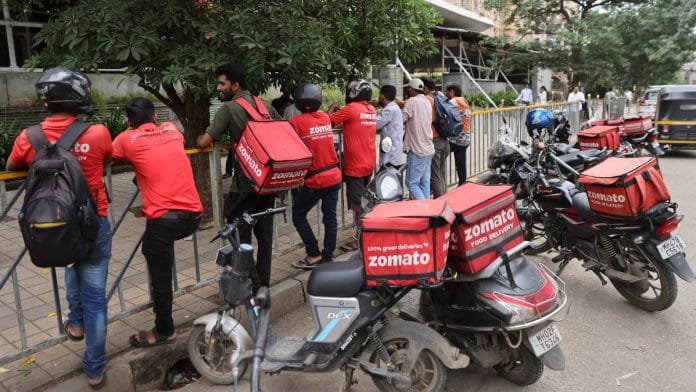Karnataka’s recent bill on social security for gig workers is the latest in a series of legislative actions to regulate India’s burgeoning technology-led businesses. Similar discussions are on in Telangana, Haryana, and Jharkhand; the former Congress government in Rajasthan also passed a law like Karnataka intends to. These efforts are all ostensibly aimed at increasing gig worker welfare by obligating the businesses contracting their services to put aside resources toward such a safety net. But they do not account for independently contracted freelancers, in organised or unorganised settings. This, along with liabilities for contributing to such social security and the absence of market-based welfare measures, reflects bad design.
These initiatives also fall short of international best practices of inclusive design. The International Labour Organization, for instance, outlines four core principles for inclusive social security systems. First, universal coverage for the entire working-age population. Second, justice to ensure all groups can participate in the safety net and receive the same benefits. Third, transparency in policies, regulations, rights and obligations of the actors involved, and fourth, financial sustainability taking into account the contributory capacities of different population groups in the social security fund.
Gig workers often juggle multiple apps and shift between part-time and full-time work. None of the states considering gig worker laws fully account for this fluidity. For instance, while Karnataka wants contracting businesses to provide ‘exhaustive reasons’ for the arbitrary termination of gig workers, it does not similarly burden the latter. That is, gig workers enjoy flexibility but their contractors do not. This is not a market-friendly outcome.
While both Karnataka and Rajasthan allow gig workers to invest in their own welfare, they don’t mandate it. Neither do they spell out the share of contributions that gig workers and businesses should respectively make. This means that in most cases, businesses end up shouldering the full burden of social security, a stark departure from how such mechanisms are usually designed. For instance, schemes like Pradhan Mantri Shram Yogi Maandhan, which covers 42 crore unorganised sector workers, mandate equal contributions from both parties. The latest state schemes may spark worker unrest on account of this uneven paradigm.
Karnataka also proposes a state-managed fund with a board predominantly composed of policymakers, much like Rajasthan already has. This risks sidelining gig workers and employers, potentially causing decision-making stalemates. In Rajasthan, the 18-member board includes six people from the government, five representatives each of gig workers and contracting businesses, and two independent experts. Karnataka’s 10-member board has five government representatives, two each representing gig workers and employers, and one independent expert. A divergence in interests between gig workers and employers could lead to gridlocks since decisions require a majority vote.
Market-based social insurance
Social insurance, a form of social security, can alleviate the concerns associated with the models proposed by Karnataka and Rajasthan. Under this system, gig workers and businesses make equal contributions. Workers have the option to increase their share of contributions too. And instead of contributing to state-managed funds, both their deposits go toward a market-based insurance plan.
This is a universal, transparent, and equitable arrangement because it treats all workers equally and allows them the flexibility to adjust their contributions based on their changing needs.
A market-based insurance model offers better coverage and avoids conflicts of interest due to the co-payment structure. Additionally, it provides the necessary flexibility to customise insurance coverage. The State must not replace markets. Both have distinct functions. States support citizens in areas where market-based alternatives don’t exist – it is quite clear that this is not the case in the context of social security for gig workers. Additionally, states can work to support market mechanisms.
States must also seek to reduce duplication to increase efficiency. For instance, both Karnataka and Rajasthan require a unique identification for gig workers. This is a redundant measure even if it is well-intentioned. The mandate seems to stem from a need to target the right beneficiaries. But each citizen already has a unique digital ID in the form of the Aadhaar, which is used widely to avail social schemes.
Also Read: Delhi govt’s newest push toward EVs burdens intermediaries & gig workers. Learn from China
Need more inclusive legal design
The ongoing legislative discussions on the gig economy are much needed because they advance the cause of a large and growing class of workers in India. But a more inclusive and exhaustive legal design is needed. The National Association of Software and Service Companies raised many apprehensions against Karnataka’s bill this month.
It called for more extensive public consultations and involvement of the departments of labour, electronics and information technology, biotechnology and science technology, and commerce and industry. The Internet and Mobile Association of India also expressed concerns against the gig workers bill, stating that it could pose hurdles to ease of doing business in the state.
In a country with a vast informal economy, gig workers are the foot soldiers, driving economic activity and innovation. As we consider social security reforms, we must acknowledge their contributions and provide them with the protection and support they deserve. A market-based social insurance model not only offers a practical solution for gig workers but also strengthens the broader economic fabric, without overburdening tech-led businesses that have done their part as the private sector must. It lies with the government to ensure these last-mile contributors are not left behind.
The authors work at Koan Advisory Group, a technology policy consulting firm. Views are personal.
This article is part of ThePrint-Koan Advisory series that analyses emerging policies, laws and regulations in India’s technology sector. Read all the articles here.
(Edited by Zoya Bhatti)






